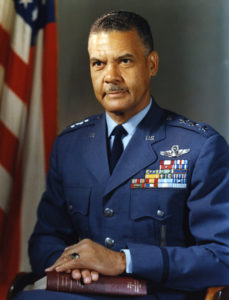
Benjamin O. Davis Jr.
Benjamin Oliver Davis, Jr., was born on this date in 1912. He was a Black army officer and military activist.
He was born in Washington, D.C., and entered the U.S. Military Academy in 1932. In his four years at West Point, no one would room with him, and no one would speak to him outside the line of duty. He dealt with the bigotry and graduated 35th in a class 276, only the fourth Black graduate in the academy's history. When he was commissioned as a second lieutenant in 1936, the Army had only two Blackline officers, Benjamin O. Davis, Sr., and Benjamin O. Davis, Jr. Cadet Davis applied for the Army Air Corps. Still, they were rejected because it did not accept Blacks.
His first posting was with the all-Black 24th Infantry Regiment at Fort Benning, GA. He was not allowed into the base officers' club, a snub he would regard as one of the most insulting actions taken against him in 37 years of military life. He was later assigned to teach military tactics at Tuskegee Institute in Alabama, something his father had done years before. It was the Army's way to avoid having Black command white soldiers.
The Tuskegee Airmen commanded by Davis compiled an outstanding record in combat against the German Luftwaffe in the European theater during World War II. They shot down 111 planes and destroyed or damaged 273 on the ground at a cost of more than 70 pilots killed in action or missing. They never lost a U.S. bomber to enemy fighters on their escort missions. As the leader of numerous missions, Davis received the Silver Star for a strafing run into Austria and the Distinguished Flying Cross for a bomber escort mission to Munich. In July 1948, President Harry Truman signed an executive order to integrate the armed forces. Davis helped draft an Air Force blueprint on integration that went into effect the following year.
His leadership of the Tuskegee Airmen, America's only all-black air units of World War II, helped speed the integration of the Air Force, and in 1954, he became its first Black general. In his autobiography, "Benjamin O. Davis Jr.: American," Davis told of the pressures he and the Tuskegee Airmen encountered in the face of racism. He mentioned. "We would go through any ordeal that came our way, be it in garrison existence or combat, to prove our worth.” Davis served at the Pentagon and in overseas posts for the next two decades. He gained the three stars of a lieutenant general in May 1965, when he was the chief of staff for U.S. forces in South Korea.
In December 1998, President Bill Clinton awarded him a fourth star, the military's highest peacetime rank. Davis retired in 1970 and briefly served as director of public safety in Cleveland. He then spent five years at the Department of Transportation, directing anti-hijacking efforts.
Ironically, Gen. Benjamin O. Davis Jr. died July 4, 2002, at Walter Reed Army Medical Center in Washington, D.C. He was 89.